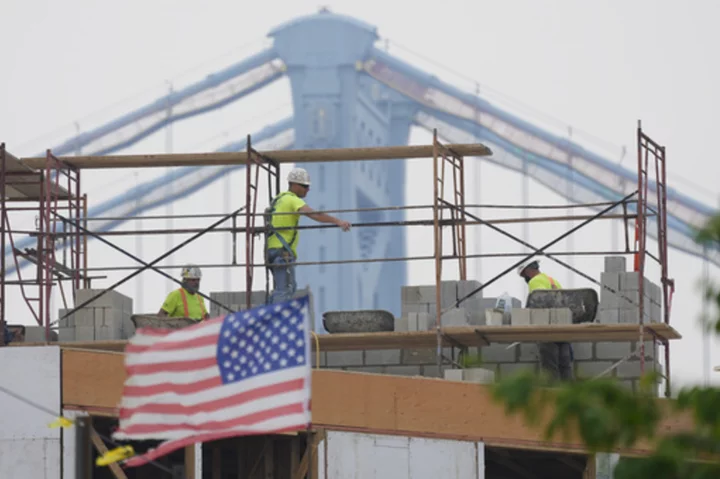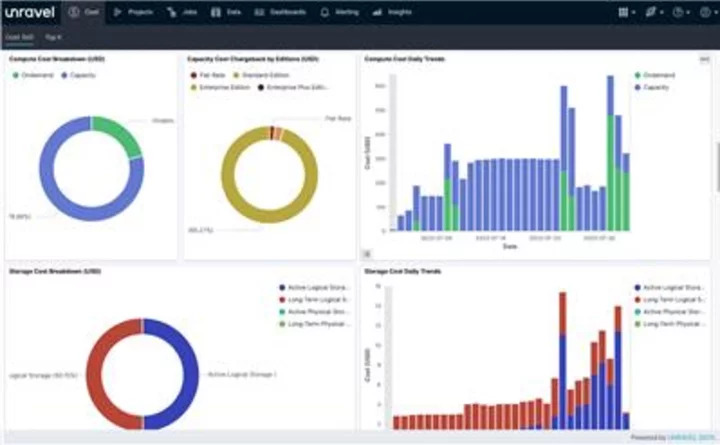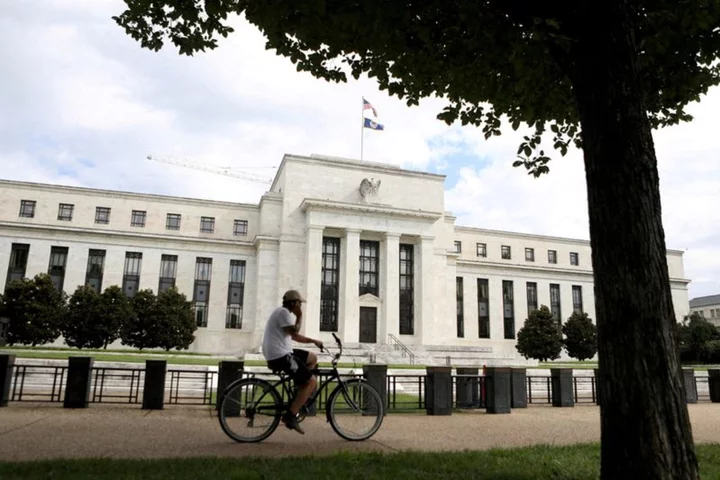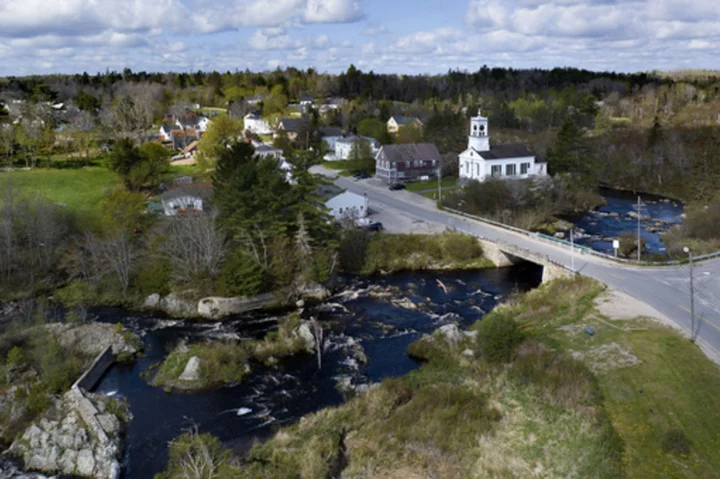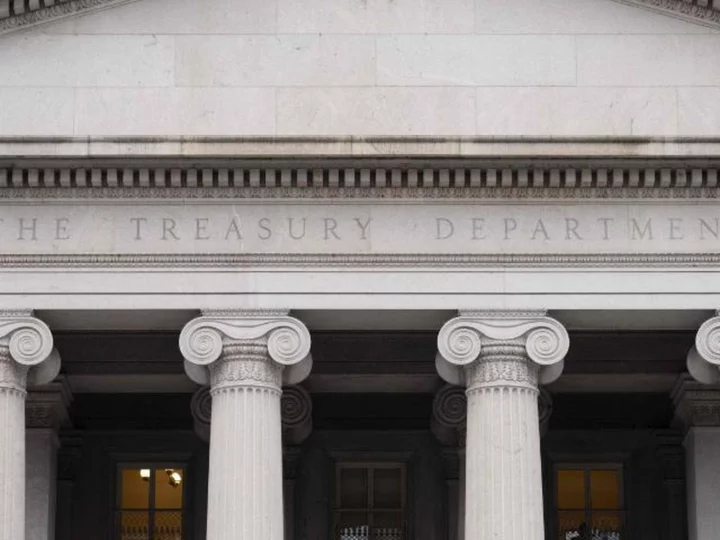NEW YORK (AP) — The hazardous haze from Canada's wildfires is taking its toll on people whose jobs have forced them outdoors along the U.S. East Coast even as a dystopian orange hue led to the cancelation of sports events, school field trips and Broadway plays.
Delivery workers, construction workers, farm laborers and railroad and airport employees on the West Coast have become all too familiar with the hazards that come with massive wildfires. Yet in the East a sun jaundiced by smoke is so novel, many workers had no idea what was happening.
Some, unprepared for the effects of smoke inhalation, left their jobs midday unable to carry on as the air quality worsened. Most, however, pushed through in the hopes that the skies would clear.
They haven't.
A laggardly weather system has settled over the region and the smoky blanket billowing from wildfires in Quebec and Nova Scotia continued Thursday, and may persist into the weekend.
New York City Public Schools announced Thursday that classes on Friday will switch to remote instruction. Most elementary and middle schools were scheduled to be off for a clerical day, however.
Meanwhile, in Philadelphia, the city suspended trash collection and outdoor street sanitation in an effort to protect workers from the air pollution. Some companies provided N-95 masks and allowed employees to take breaks indoors but labor rights groups pushed for more protections, replaying a years-long struggle that began in California and other Western states.
Food delivery workers on bicycles and scooters crisscrossed the streets of New York City even though a “Code Red” alert remained in place Thursday.
Bimal Jhale, 43, tried to set out on his scooter to make deliveries for Grubhub on Wednesday afternoon but was already dizzy after working as cook in a diner that morning. By evening Jhale, father of a 5-year-old boy, had recovered somewhat and tried again.
“We are taking all these risks and still what we are making is barely enough to survive so we can’t afford to miss work for even one day,” said Jhale, who spoke in Hindi through a translator from the Justice for App Workers organization.
Grubhub alerted drivers that they would not be penalized if they didn’t feel safe completing deliveries and reminded those with pre-existing conditions to stay inside, a company spokesperson said.
In recent years labor agencies in California, Oregon and Washington have adopted rules requiring employers to provide protection from wildfire smoke, including N95 respirators, breaks and sometimes moving operations indoors. California Gov. Gavin Newsom passed a bill in 2021 allowing farmworkers access to the state’s stockpile of N95 masks.
While wildfire smoke has traveled across the continent to the East Coast in the past, conditions this week were particularly severe. There is little official guidance in the East related to wildfires and there are no such specific standards at the federal level, though employers must protect workers from wildfire smoke under general laws requiring safe work sites.
There are potential long- and short-term financial and health ramifications for workers. A study last year found that every day of exposure to drifting wildfire smoke can reduce workers’ quarterly earnings by 0.1% — a toll that comes to $125 billion a year in lost income.
“One thing that seems really clear from our research is that the effects of smoke on labor earnings or labor market incomes will extend past the days in which the smoke is bad,” said Mark Borgschulte, one of the study’s authors and an assistant professor in economics at the University of Illinois Urbana-Champaign. “You can see people having heart attacks on days when air pollution is bad. That’s going to affect them for a long periods of time.”
Wildfire smoke contains hundreds of chemical compounds, experts note. In the short term, vulnerable people can be hospitalized and sometimes die from excessive smoke. Scientists have also linked smoke exposure with long-term health problems including decreased lung function, weakened immune systems and higher rates of flu.
Even when rules are in place, labor activists say getting companies to comply is another matter.
Tony Cardwell, president of the country's third-largest railroad union, said he has clashed with rail companies over protections for workers in California even after new wildfire rules were place. He said the Brotherhood of Maintenance of Way Employees Division, which represents track maintenance workers, is sending emails this week to railroads operating in the East to seek protections, including air quality monitoring and rescheduling work.
Norfolk Southern is conducting air monitoring and working with regional teams to provide workers with N95 masks where needed, spokesperson Connor Spielmaker said. Amtrak also said it was making masks available to employees who request them and was monitoring air quality across the region.
Other companies scrambled to take similar steps.
Ground crews for Delta Air Lines are coming indoors in between aircraft turns, the time between when a plane pulls up to the gate and the next flight pushes back, said company spokesman Morgan Durrant.
Alex Kopp, safety director for The Association of Union Contractors, which represents 1,800 construction contractors, said the group was “concerned that air quality will have an effect on jobsite safety” and urged members to take precautions. But he acknowledged that “the current air quality certainly presents a new challenge.”
Local 3 IBEW, an AFL-CIO affiliated union representing electrical workers in New York, said it received reports of only two jobs sites closing Wednesday due to air quality issues despite public warnings to remain indoors, though some contractors are requiring masks.
Many workers were left to navigate the threat on their own.
Victor Aucapina, a construction worker doing a home renovation in Brooklyn, pulled his T-shirt over his nose between bites as he sat on a curb during a lunch break. Aucapina said he opted to keep his two young children home from school Wednesday but said he couldn’t miss work as his family's sole breadwinner.
He was caught off guard as skies grew more yellow by lunchtime and winds carried with them the scent of burning trees.
“I didn’t think it would so bad. Now I feel the smoke, the smell,” said Aucapina, who added that he may bring a respirator if conditions don’t improve but missing work would “be a last resort.”
Wildfires of this size are so novel in the East, many workers did not immediately grasp the threat.
Warren Duckett didn't realize anything was wrong when he set out for his construction job in Washington, D.C., Wednesday morning and heard about the wildfires on the radio. Soon, one co-worker was on his way home suffering from smoke-related sinus issues, but Duckett pushed on.
“We thought it was just a foggy morning," Duckett said.
Duckett was hopeful that the skies would clear in the afternoon, but as in New York, that was not the case.
Conditions worsened in the country's capital Thursday as air quality warnings deteriorated from “Code Red,” to “Code Purple."
____
Associated Press Writer David Koenig in Dallas and Paul Wiseman in Washington, D.C. contributed to this story. Grantham-Philips reported from Washington, D.C.

